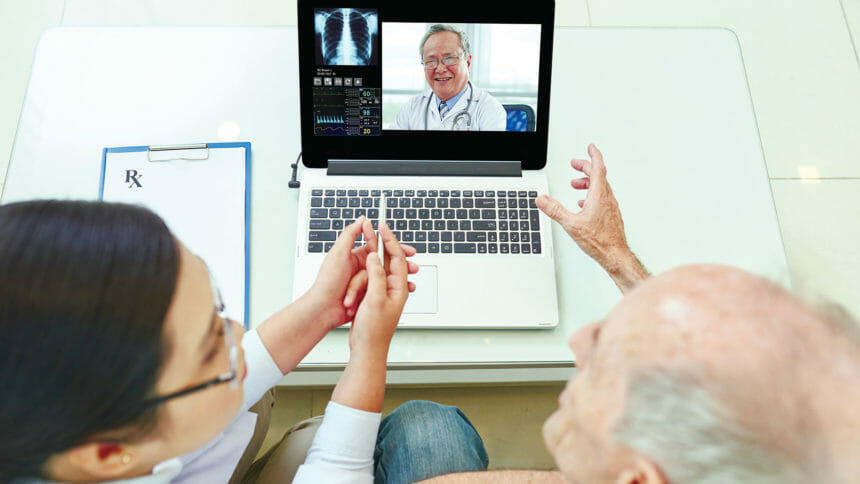
In a new survey on perceptions of virtual doctor appointments, older adults were least likely to cancel doctor appointments and were more satisfied with the experience of virtual visits as compared with other age groups, but they were more likely not to trust the physician or care from a virtual visit.
Caring Advisor surveyed 1,001 people (average age, 38.8 years) about their experiences with and perceptions of virtual doctor appointments in “The Digital Doctor: Exploring Perceptions of and Experiences With Virtual Doctor Appointments.”
“The world is changing, and the way we interact with doctors is also changing,” Chris Westmeyer, founder and president of Digital Strike, the St. Louis marketing agency that owns the Caring Advisor website, told McKnight’s Senior Living. “As people 50+ are starting to use telemedicine more, it is interesting to see them embrace the process better than all other age groups.”
Although most survey respondents said they had tried telemedicine at some point in their life (68.7%), those aged 50 or more years were the least likely to have participated in a virtual doctor appointment before the COVID-19 pandemic. Despite that, this age group reported the highest satisfaction rate with the experience of a virtual appointment
Although few people in this age group reported being completely disappointed with a telemedicine experience (less than 2%) compared with those in other age groups, most reported encountering difficulty both in scheduling an appointment (66.6%) and using technology during the appointment (70.8%). Westmeyer said the 50+ age group “seems to be a little less technology-savvy,” which may make them less inclined to participate in a telemedicine visit.
When it comes to considering virtual care, people in the 50+ age group were the most likely among survey participants to say they would trust their physician less during a virtual appointment. They also were the most likely to believe the care they receive in a virtual appointment would not be as good as that from an in-person appointment.
Top concerns about virtual doctor appointments from all respondents included receiving a misdiagnosis (38.8%), having technology difficulties (35.5%), not being able to run more tests (32.4%), medical records not being secure (23.9%) and not getting enough time and attention from the physician (20.3%).
Survey respondents as a whole also indicated they were most comfortable completing virtual appointments with their primary care physicians (74.5%), psychiatrists (70.1%), allergists (62%), gastroenterologists (53.5%) and infectious disease specialists (53.1%).
When asked about preferences for non-emergency medical care in a post-COVID-19 world, the 50+ age group overwhelmingly supported a return to in-person appointments (74.2%) compared with virtual appointments (25.8%).
The survey authors pointed to the major upsides of telemedicine for all age groups, including lowered transportation costs, flexibility in scheduling and a decreased chance of contracting an illness at a physician’s office. But all groups maintain a preference for in-person appointments (68.3%).




